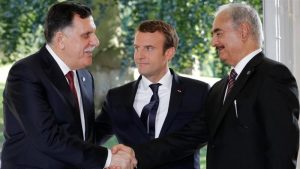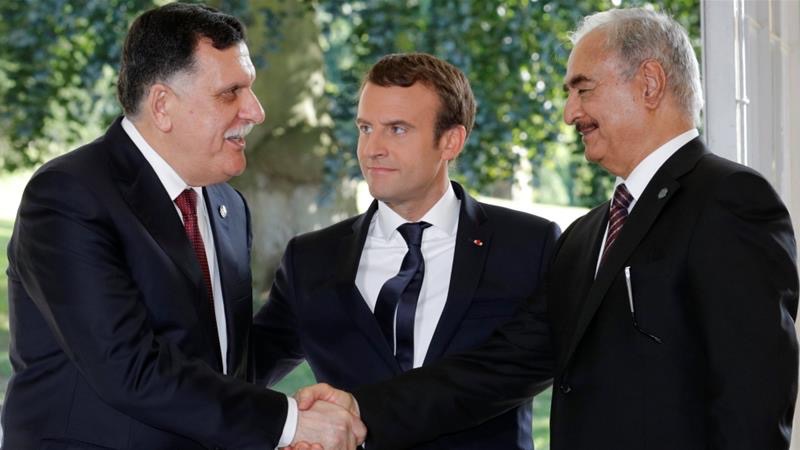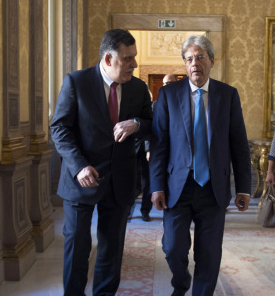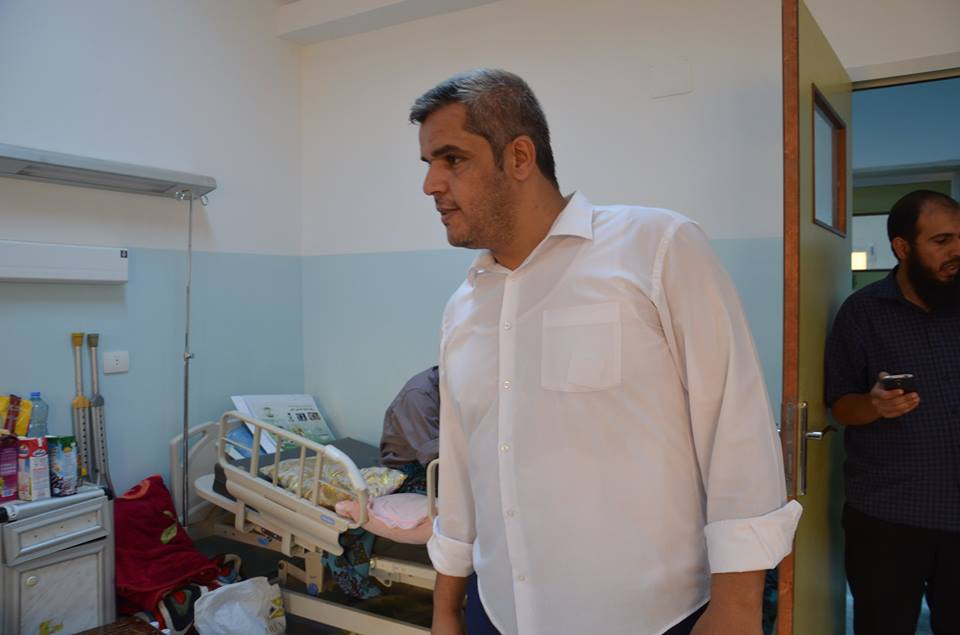By Michel Cousins.

Paris, 25 July 2017:
Presidency Council leader Faiez Serraj and Libyan National Army leader Khalifa Hafter have agreed that there has to be a ceasefire and new elections in Libya. The agrement came during their talks today near Paris.
“We commit ourselves to a ceasefire” and “we make a solemn commitment to work for the presidential and parliamentary elections as soon as possible,” Sarraj and Haftar said in a ten-point declaration. – their first such public joint statement. However, in an indication that nothing is cast in stone, the declaration was not signed.
Significantly, in a move that will not be appreciated by several members of the House of Representatives or among some of Hafter’s own advisers, both he and Serraj also agreed that:
- There could only be a political solution to the Libyan crisis;
- They would work to put the Libyan Political Agreement approved at Skhirat into full operation;
- The State Council and the HoR would play a role in the political dialogue;
- They would have further meetings;
- They would work to “create favourable conditions” so that elections can take place; and
- They would make every effort to integrate “combatants” who wish to do so into the regular Libyan armed forces;
Among other points of agreement, they agreed to would work on a roadmap that would see a united military combatting terrorism and dealing with illegal migrant flows, and called on the UN Security Council to support their agreement and the new UN special envoy Ghassan Salamé to undertake consultations to that end with the various key Libyan players.
Salamé took part in the discussions.
In response, French President Emmanuel Macron hailed the “historic courage” of the two men, saying that “today, the cause for peace in Libya made major progress”.
Serraj called it a “great step” towards reconciliation and lasting peace.
So far, despite the unlikelihood of it appealing to certain members of the HoR such as the National Sovereignty Bloc or HoR president Ageela Saleh, the meeting and agreement have drawn initial tentative approval from a number of HoR member and those of the State Council.
Benghazi HoR member Abu Bakr Buera has said that the Paris meeting could create a political momentum in Libya while State Council member Wahid Barshan praised it on the basis that it would lead to fresh elections.
In a sign of dissent, however, the Muslim Brotherhood’s Justice and Construction Party issued a testy statement criticising the meeting, saying that any such gatherings organised by individual countries were a deviation and distortion of the LPA and opened the door to those countries using their influence for their own interests.
Text of the Joint Paris Declaration
In support of the work of the United Nations and in the context of implementing the Skhirat agreements, taking into account the initiatives of the international organisations involved with Libya, in particular the African Union, the European Union, the League of Arab States, while highlighting the efforts made by friendly countries and partners of Libya in recent months, in particular Egypt, Algeria, the United Arab Emirates, Morocco, Tunisia and Italy;
The President of the French Republic, Emmanuel Macron, wished to contribute to the resolution of the Libyan crisis by inviting on 25 July 2017 in La Celle Saint-Cloud, the President of the Presidential Council of the National Unity Government, Fayez Serraj, and the Commander of the Libyan National Army, Khalifa Hafter.
This initiative comes in full support of the mission of the new Special Representative of the Secretary-General of the United Nations, Ghassan Salamé, who participated in the exchanges on 25 July. The objective of France is to contribute to the development of a political solution and to help the Libyans to strengthen the inter-Libyan political agreement of Skhirat so as to make it more effective and inclusive.
The meeting at La Celle Saint-Cloud is a continuation of the meetings that have already taken place at different levels, in Abu Dhabi, Cairo, Algeria, and takes up those elements that have been agreed. It aims at the continuation of an inclusive and supported inter-Libyan dialogue in which all actors of good will have their place.
In this context, the following statement was adopted by the Libyan parties present:
“We, Faiez Sarraj, President of the Presidential Council of Libya, and Khalifa Hafter, Commander of the Libyan National Army, met at Celle Saint-Cloud on 25 July 2017 at the invitation of the President of the Republic and In the presence of Mr Ghassan Salamé, Special Representative of the Secretary-General of the United Nations for Libya, in order to advance the cause of national reconciliation and we have agreed as follows:
- The solution to the Libyan crisis can only be political and involves a process of national reconciliation involving all Libyans, including institutional, security and military actors of the state, who are ready to participate peacefully, with the return in full security of displaced persons and refugees, the establishment of a transitional justice process, compensation and a national amnesty, and the application of Article 34 on the security arrangements of the Libyan Political Agreement;
- We commit ourselves to a ceasefire and to refrain from any recourse to armed force for anything that is not strictly anti-terrorist in accordance with the Libyan Political Agreement and international treaties, and thus to protect the territory and sovereignty of Libya, and we firmly condemn all that threatens the stability of the territory;
- We are committed to building the rule of law in Libya, a sovereign, civil and democratic state that guarantees the separation and peaceful transfer of power and respect for human rights and has unified national institutions, the Central Bank, the National Oil Corporation and the Libyan Investment Authority. This state shall guarantee the security of citizens, the integrity of the territory and the sovereignty of the state, and the proper management of natural and financial resources in the interests of all Libyans;
- We are resolved, supported by the impartial work of the Special Representative of the Secretary-General of the United Nations, to operationalise the political agreement of 17 December 2015 and to continue the political dialogue in continuation of the Abu Dhabi meeting of 3 May 2017;
- We shall make every effort to accompany the consultations and the work of the Special Representative of the Secretary-General of the United Nations, which must be the subject of an inclusive political dialogue in which the House of Representatives and the State Council will have their place;
- We will continue our dialogue beyond the meeting of La Celle Saint-Cloud, in compliance with this declaration, and we pledge to create conditions favourable to the work of the House of Representatives, the State Council and the High National Elections Commission for the preparation of the forthcoming elections;
- We will make every effort to integrate combatants who so wish into the regular forces and call for the disarmament, demobilisation and reintegration of others into civilian life. The Libyan army will consist of regular military forces defending Libyan territory in compliance with Article 33 of the Libyan Political Agreement;
- We have decided to work towards the establishment of a roadmap for the security and defence of Libyan territory against threats and trafficking of all kinds. We will work to ensure that all security and military forces involved join in this plan as part of the reunification of military and security institutions in order to coordinate in the fight against terrorism, to control migration flows which transit Libyan territory, to secure and control borders, and to combat organised criminal networks that are using Libya and destabilising the central Mediterranean area;
- We make a solemn commitment to work for the holding of the presidential and parliamentary elections as soon as possible, as of 25 July 2017, in cooperation with the institutions concerned and with the support and supervision of the United Nations;
- We call on the United Nations Security Council to support the objectives of this statement and the Special Representative of the Secretary-General of the United Nations to engage in the necessary consultations with the various Libyan actors.










